|
I was well into my 20s before I became aware that skateboarding was not just a pastime for well-balanced athletes but an entire subculture. Then again, when I was growing up nobody I knew even owned a skateboard let alone knew how to ride one. My first exposure to them came on trips up to London during my post-film school years, where abandoned concrete car parks whose walls and floors had been daubed with colourful graffiti were being reclaimed by skaters and used as makeshift rinks in which to practice and demonstrate their considerable skills. When I did get to try my hand at riding a skateboard a couple of years later I was absolutely hopeless, my poor sense of balance and misplaced centre of gravity sending me tumbling to the ground almost as soon as my foot touched the board.
A few years later, I moved town and house and ended up living a mere half-mile from a purpose-built indoor skateboard park, and every day since I have been serenaded by the sound of skateboard wheels on pavement as their riders barrel past my front door on their way to and from this hugely popular venue. Over time I've got to meet and talk to a few of them and have learned more about what they regard less as a hobby than an all-consuming passion. For some, I discovered, it was a way of life, and the more I read about them and watched them perform, the more I admired and envied their skill.
For me, this little bit of self-discovery came a little too late. I'm fully aware that the skateboarding days that I never had in the first place are long since behind me, and that if someone of my age, my physical fragility and my shocking sense of balance were to fall from a skateboard onto concrete at speed, then I'd likely end up in traction for months. Yet whenever I see someone gliding effortlessly along on a skateboard as if it was a natural extension of their body, I so wish that I could do likewise with a similar degree of grace. I also rather like the fact that these guys (and most of those I've met are guys) seemed to have no set look or style and tended instead to embrace whatever felt good to them as individuals. You want to wear your hair long? Go for it, but short or spiky or half-shaved is OK too. And there's no uniform for skating, you just wear whatever feels comfortable and won't constrict you when you ride. This freedom of expression was epitomised by the pioneering California skaters of the 70s, who seemed to combine the hang-loose attitude of 60s hippiedom with the fuck-you energy and wilful anarchy of the punk generation.
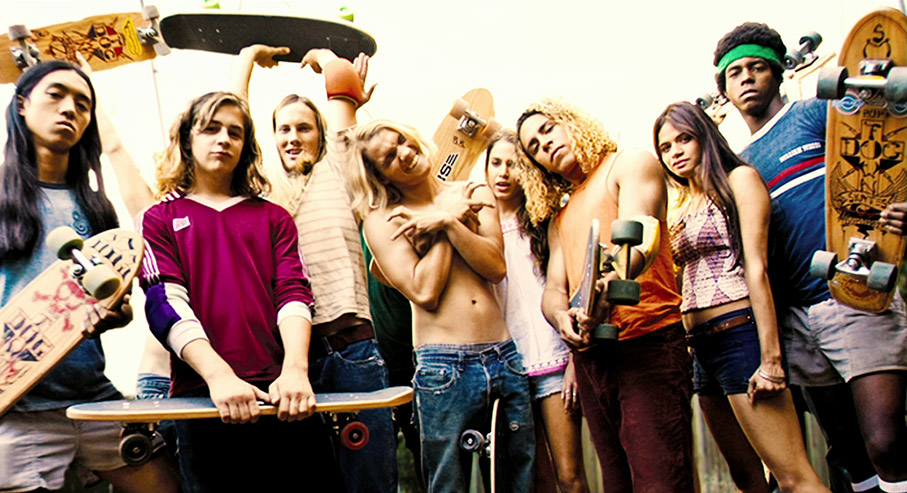
My fascination with skaters was upped several notches I first caught the documentary feature Dogtown and the Z-Boys, which not only confirmed what I'd learned about the skateboarder subculture, but made it seem even cooler than I'd ever imagined. It's here that I learned about the real pioneers of the sport, the ones who predated the ever-marketable Tony Hawk and who effectively shaped skateboarding as we know it today. Think Jay Adams, Tony Alva and Stacy Peralta, and let's not forget Skip Engblom, the co-owner of the surf shop in which these guys all gravitated and co-founder of the Zephyr Team in which they skated their way to individual stardom. And Dogtown and the Z-Boys is not just educational, it's a vibrant and utterly seductive film experience, a rock 'n' roll cinematic extension of the subculture from which it grew. Then again, it was directed by original Z-Boy turned filmmaker Stacy Peralta, one of the sport's first fully-fledged international superstars.
Lords of Dogtown is effectively a dramatisation of the story told by Dogtown and the Z-Boys, and while there is some compression of elements and a little artistic licence here and there,
it is otherwise strikingly faithful to its source and does not over-embellish or get creative with the facts for dramatic effect. Then again, it doesn't need to. The story of the Zephyr Team – a group of street kids from broken homes who graduated from surfing to skateboards, then developed their skills to a level that ultimately transformed their lives – has all the drama that any savvy filmmaker could possibly need.
If you're unfamiliar with story, here's all you need to get you started. In Venice, California back in its run-down, unfashionable days in the early 1970s, a group of outcast surfers begin applying the techniques they have developed on the waves to their increasingly adventurous and athletic skateboarding. When a summer drought empties the local swimming pools, they regularly invade the back yards of wealthy households and turn the pools into improvised skating rinks, in the process developing the skills that would transform skateboarding from a pastime to an international sport.
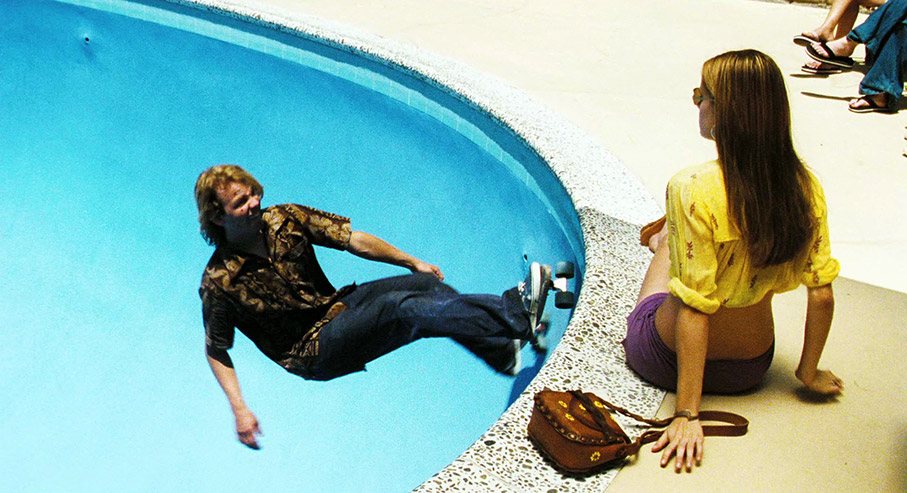
It's worth remembering that while skateboards had been around for a decade or so by this time, skateboarding itself had fallen out of fashion. Even during its resurgence in the early 70s, skating was largely confined to flat surfaces or gentle slopes, and the early competitions required contestants to demonstrate long-standing skills and tricks on a featureless wooden rink. By this point, the Z-boys were already riding concrete ramps wherever they could find them, but once they began invading backyard pools they seriously upped their game, hitting and climbing steep slopes at speed and in the process inventing the concept of what became known as vertical riding. When we watch them enter their first couple of competitions, it thus seems as ridiculous to us as it does to them that they are expected to confine themselves to riding around on a square slab of largely obstacle-free hardwood. That the moves they do pull off were revolutionary for their day (no-one rode low or used their bodies and even hands as part of the display in the way these guys did) does not come across as clearly in this film as it does in Dogtown and the Z-Boys, but the disruption they caused to the status quo certainly registers, even if it takes Skip's cheerfully bullish behaviour and Tony's righteous temper to get that across.
That the film is largely faithful to the characters and events that inspired it is perhaps not so surprising when you realise that it was written by Zephyr team superstar and Dogtown and the Z-Boys director Stacy Peralta, that his fellow Zephyr Team pioneer Tony Alva helped to coach the young actors in their skateboard skills, and that other Zephyr Team members acted as advisors. Director Catherine Hardwicke (who was brought on board because of her debut feature, Thirteen) clearly had real respect for the people whose lives she was depicting, and the result is a recreation of actual events in which the liberty taking is kept to a minimum but that also delivers as entertainment. Visually and aurally, Hardwicke takes some key cues from Dogtown and the Z-Boys, notably in the stylised visuals, the powerhouse editing and a soundtrack that plays like the blood brother of its documentary forebear (different tracks are used, but by many of the same artists). What Hardwicke does bring to the party is a kinetic visual energy that as well as observing the skateboarders in motion, propels us along as if we are skating with them, thrillingly shadowing their every move as they rocket between cars, hang steep curves in empty pools, or glide up and down the ramps on graffiti-sprayed drainage ditches. Hardwicke's ace in the hole here is the killer duo of French roller-skating camera operator Philippe Dussol (whose high-speed mobile camerawork and stunt skating on the 2000 short film Argent content has to be seen to be believed) and top-flight skateboarding cameraman Lance Mountain, who thrillingly swoops up and down the ramps with the skaters as if physically bonded to them.
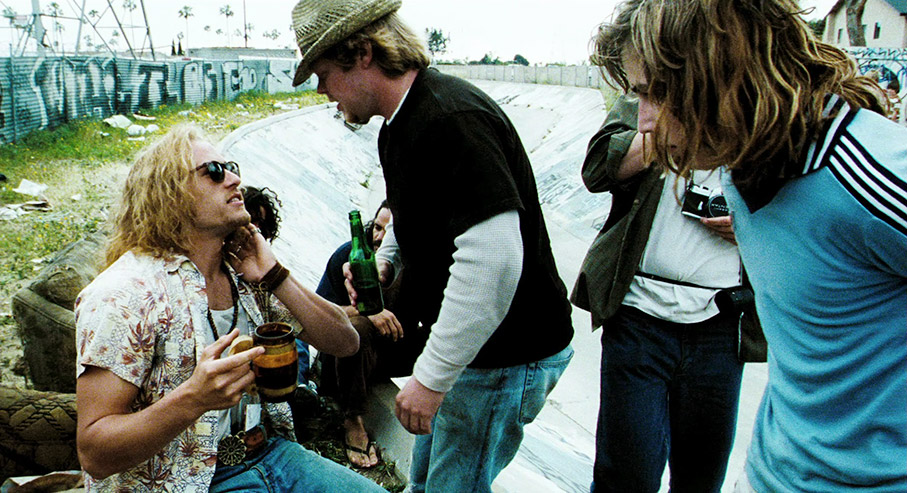
In recreating the story as a drama, Peralta and Hardwicke are able to personalise the journey outlined so compellingly in Dogtown and the Z-Boys and allow us get to know the main players as people, albeit through performed recreations of who they once were. As Zephyr team stars to be, John Robinson, Emile Hirsch and Victor Rasuk not only look the part as Stacy Peralta, Jay Adams and Tony Alva, but really hold their own both on and off the boards, having gone through a solid two months plus of training to ensure that they embody every aspect of the true-life characters they play. There's solid support from Rebecca De Mornay as Jay's mother Philaine, an almost unrecognisable Johnny Knoxville pimped up as wealthy promoter Topper Burks, and in a sprinkling of blink-and-you'll-miss-them skater cameos, that's Tony Hawk himself as the astronaut who steps on Stacy's skateboard and lands flat on his backside. But stealing just about every scene he's in is Heath Ledger as surf and skate guru Skip Engblom, his colourful mannerisms, toothy delivery and stoner attitude proving not just entertaining, but according to those who were there, uncannily accurate.
That the fame and wealth that Stacy and Tony seek and ultimately achieve requires the break-up of the group and the side-lining of the man who effectively got them all started certainly hurts more when played as drama than when presented as fact in Dogtown and the Z-Boys. By this point I'd got to know and rather like the characters and enjoy the rebellious dynamic that made the Zephyr team the crew to be part of in early 70s California, and their sneaking into back yards and hijacking empty pools until chased off by the cops has an outlaw appeal that the later, big budget competition wins simply cannot match. That the film concludes in a heart-warming scene of partial reunification around a pool that became known as the Dogbowl may feel a little manufactured, but even this is based on an actual event, one that provided Peralta's documentary with a similarly upbeat finale.
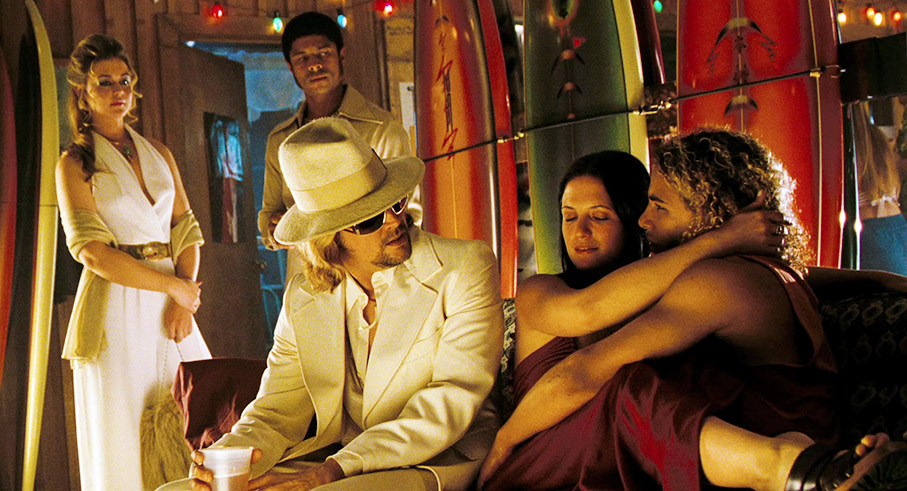
There really is the sense here that Peralta didn't so much write the script as filter his own memories and experiences into a working narrative, his aim being to give us just a flavour of how much damned fun it was to be a Zephyr skateboarder, something Hardwicke and her cast and crew respond to with aplomb. But if you do get to see and enjoy this film (and this disc is definitely the way to do it), then I'd seriously recommend also getting hold of Dogtown and the Z-Boys (it's available to rent on iTunes), which expands considerably on the story and provides the sort of historical context you'll not find in Lords of Dogtown. It also helps you to appreciate just how much Hardwicke and her collaborators got right, and how many of the earlier film's recollections have been recreated here. As a long-time fan of Peralta's documentary, I enjoyed this dramatization of the story immensely, though it did leave me even more wistful about never having mastered this particular skill when I was young enough to do it without risking serious injury. Then again, perhaps it's never too late. Last year, I let it slip that I regretted never having learned to even ride on a skateboard without falling on my arse, and a couple of months later was given a second-hand board with the encouragement to would give it a go nonetheless. Progress has been delayed by a surgical operation on my foot that went a bit wrong and has left me struggling to even walk, but once I recover (maybe that should be if...), keep your eyes peeled for reports of the middle-aged idiot who fell off a skateboard whilst trying to do the simplest of tricks and is now sitting in hospital, wrapped up in plaster, with a curiously satisfied smile on his face.
If you’re looking for naturalistic colour, then you’ve come to the wrong movie. The palette of Lords of Dogtown is deliberately and eye-catchingly stylised, a blend of tinted lighting and post-production game-playing with the colour and contrast that feels designed to reflect the early 70s skater lifestyle, an expressionist reflection of the bright colours and deep hues of the local graffiti or the board designs for which the Zephyr shop became famous. With that in mind, the transfer on the Blu-ray in this dual format set is top-notch, vividly recreating the stronger colouration and exhibiting a strong level of detail when the image tinkering allows. The contrast is punchy with rigid black levels, though as contrast and brightness have also been played with in post-production, like the colour they can (intentionally) vary on a scene-by-scene basis. Grain is often visible enough to suggest it was intended aspect of the visual aesthetic, and the image is clean of any dust or damage and rigidly stable in frame throughout.
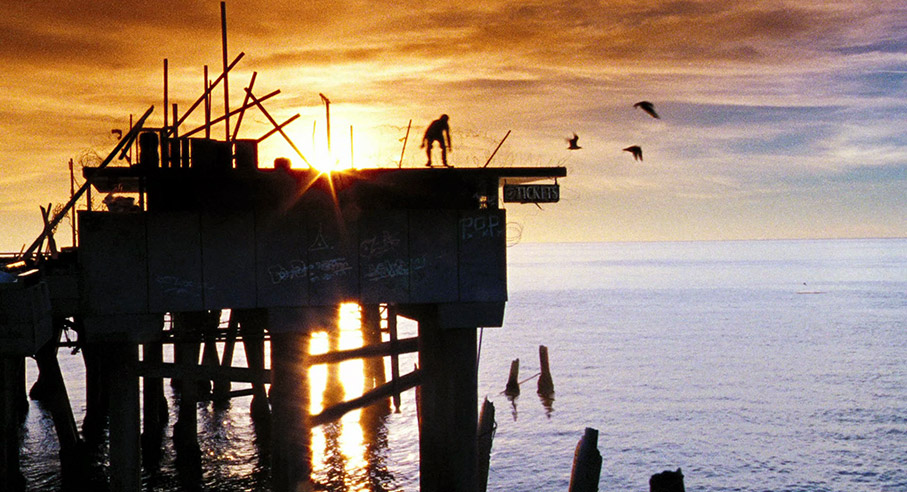
The DTS-HD master Audio 5.1 surround soundtrack is a lively beast, boasting consistently clear dialogue, thumpingly vibrant reproduction of the various music tracks, and an enveloping use of the full surround stage – in the Dogbowl finale, the skateboards roar around the room behind and beside you in sync with their riders, really placing you in the camera operator’s shoes.
Optional English subtitles for the deaf and hearing impaired are available.
Introduction by Director Catherine Hardwicke (1:21)
Director Catherine Hardwicke introduces what she calls ‘Dogtown Unleashed’, which is basically the unrated version included on this disc as opposed to the trimmed PG edit that was first shown in cinemas. We get some brief information on the nature of the cuts, and are told why the ratings board preferred ‘vintage ass’ to ‘grey beaver’. I’m saying no more. In common with almost all of the other extra features here, this is standard definition and framed 4:3, so I’m guessing was licensed from an earlier DVD release.
The Making of Lords of Dogtown (29:56)
Actually titled Deconstructing Dogtown, this making-of documentary goes out of its way to be every bit as rock ‘n’ roll as Dogtown and the Z-Boys. It covers a lot of ground at sometimes breakneck speed, from the genesis of the project and the choice of Hardwicke as director to training the young actors to surf and skate to the standard required for the film. Most of the main characters are concisely profiled, and we’re given a quick look at the process of recreating the Dogbowl pool, the Del Mar competition stadium and the run-down Pacific Ocean Park Pier. There’s some welcome behind-the-scenes footage of the actors training in the Dogbowl and of master skateboarding cameraman Lance Mountain at work, while the real Skip Engblom chips in that his wife thinks the portrayal of him in the film is spot on, adding, “which is great for me at home because now she thinks she’s sleeping with Heath Ledger.”
Dogged on Dogtown (6:52)
A featurette detailing the three worst accidents suffered during the course of the filming, all of which occurred on the Dogbowl shoot. Surprisingly, one of whose victims was director Catherine Hardwicke, who fell headlong into the pool and suffered a fractured occipital bone when she missed her footing.
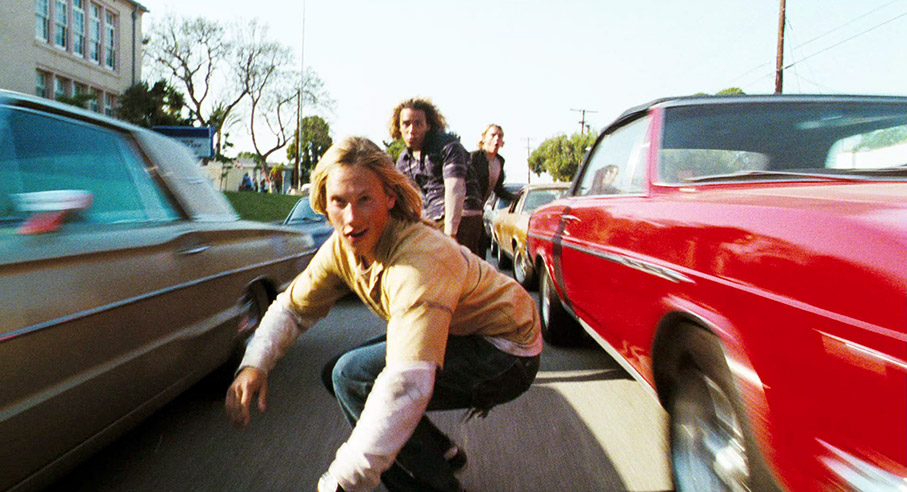
Bails and Spills (1:10)
A brief compilation of some of the skateboarding spills suffered during the course of making the movie.
Extended Pool Session (1:37)
Some of the best pool skating footage that didn’t make the final cut, introduced by Catherine Hardwicke.
Of Course We Want a Skateboarding Bulldog (2:20)
The story of Tyson, the skateboarding bulldog who appears in a competition sequence in the film, outtakes of which are included here. This is one bizarre damned animal.
Making of Pacific Ocean Park (4:36)
A look at how the run-down Pacific Ocean Park Pier was recreated for the film, with purpose-built elements convincingly blended with CGI. It turns out that decrepit Ferris wheel was not built from scratch but bought by the production on eBay for $7,000 and then roughed up by the props team.
The Ocean Washes My Hair (2:22)
Here we get to see some of the lead players with their surf and skate doubles, and it really is hard to tell them apart at times. In an odd glitch on the review disc, which may well be corrected on the release version, this also plays as the second half of the previous extra, whose above-quoted running time reflects that fact.
Storyboard to Screen (4:49)
As the title suggests, storyboards for a number of sequences are compared with the finished product.
Deleted Scenes (19:09)
17 deleted scenes, most with timecode and location sound only, and often topped and tailed with footage to show where they originally sat. There are some small but still interesting character details revealed here, a number of which are short extensions of existing scenes, and there’s a telling sequence in which Stacy’s parents can’t believe he’s getting cheques for thousands of dollars for skateboarding and assume he must be involved in criminal activity.
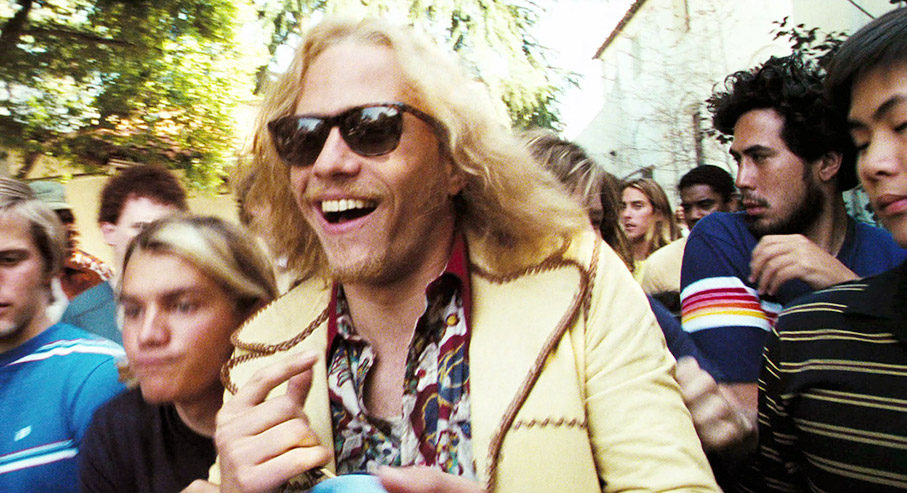
Gag Reel (4:27)
A ramshackle collection of fluffs, falls and gooning around.
"Nervous Breakdown" by Rise Against (2:13)
A by-the-numbers movie tie-in music video in which the band’s performance (they play Black Flag in the film itself) of the song is intercut with extracts from the movie.
Original Theatrical Trailers (4:57)
Two almost identical trailers for the film. A pretty good sell x 2.
Uncensored Cast and Crew Commentary
This you won’t find in the extra features but on the setup menu, which does run the risk of accidentally concealing one of the most substantial special features. Here director Catherine Hardwicke and actors Emile Hirsch (Jay), Victor Rasuk (Tony) and John Robinson (Stacy) indulge in a consistently jovial look back at the shoot, with good-natured joshing and “oh, do you remember...?” reminiscing coming close to overwhelming the more revealing information and anecdotes. But there’s plenty of good stuff, and many of the more laughter-filled memories are interesting in themselves (there was apparently a bit of a battle between the younger actors over who would get to hug Rebecca De Mornay in her revealing bikini top), and it was here that I learned that Stacy Peralta and Tony Alva helped to select the skateboarding takes that most closely matched their own very individualistic styles.
If even inventively filmed skateboarding leaves you nonplussed, then Lords of Dogtown may well come across as a lively but otherwise unexceptional tale of talented poor boys who make good by doing their own thing and screwing the system they eventually become swallowed up by at the cost of their former friendships. It also tends to play second fiddle to its documentary forbear, Dogtown and the Z-Boys, which covers the same ground in more (factual) detail and just as entertainingly. But in the process of dramatising the story, Peralta and Hardwicke have put greater focus on the personalities of the people who led this revolution in skating and their personal and professional relationships with each other. It looks and sounds the business, is well cast and performed, and boasts some of the most excitingly shot skateboard footage I’ve seen in a dramatic feature. The short length of some of the extra features means there’s not quite as much here as a first glance suggests, but this is still a packed disc with a grade-A transfer, one that this wannabe skater has no problem recommending.
|